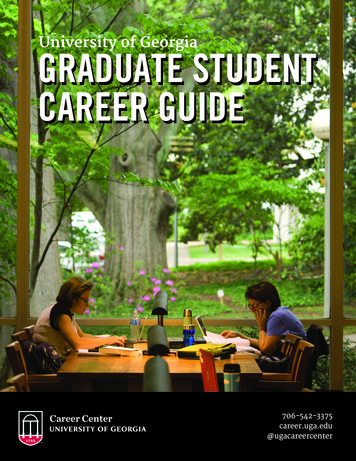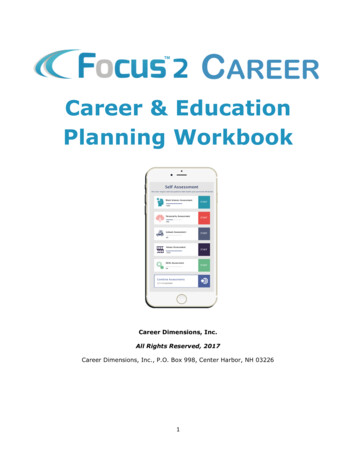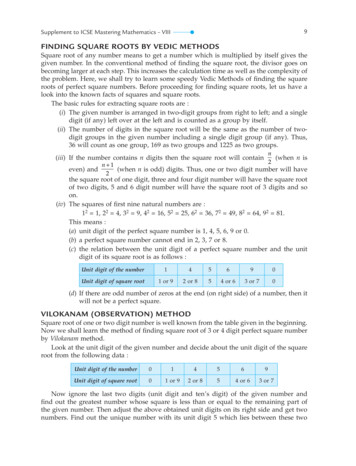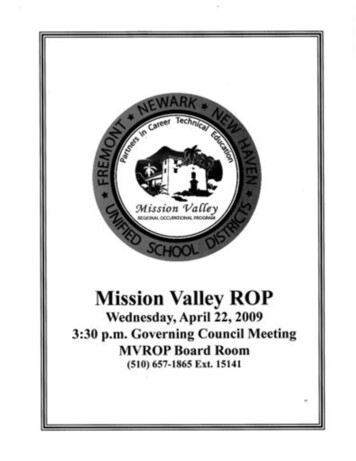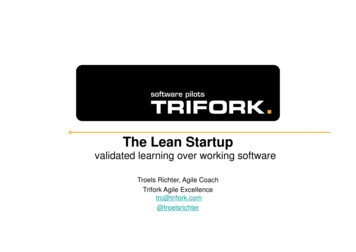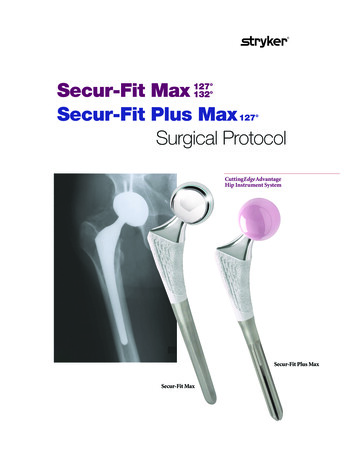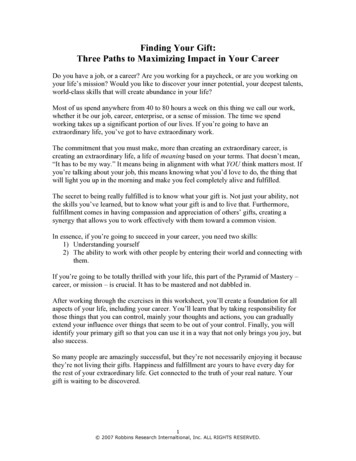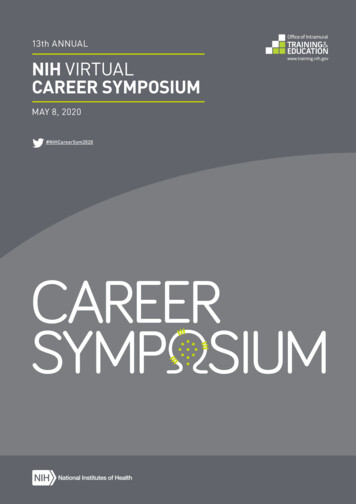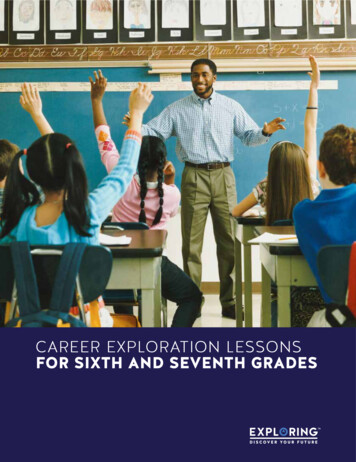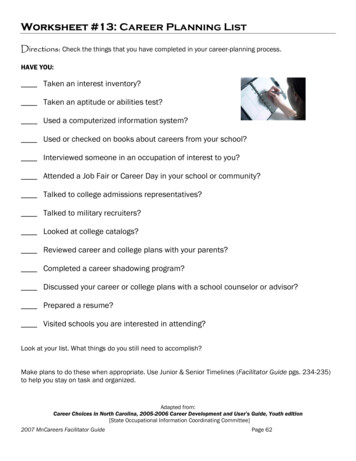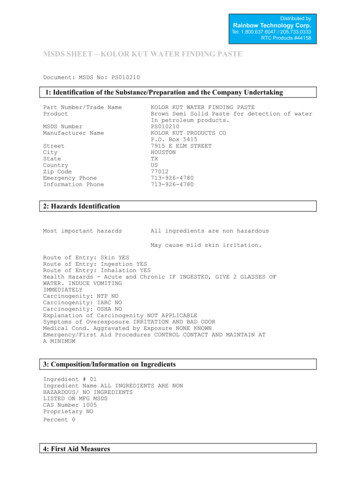
Transcription
indexIntroduction. .3Your Career Daydream . 4What You Enjoy . 5Your Interests 6Your Personality . 8Your Skills .13Your Values .16Your Career Fit .17UGA Majors Checklist . 18Next Steps .202 Page
introductionAre you undecided about which major or career path to choose?You are a unique individual, full of potential to pursue and accomplish your career dreams. Sometimes itcan seem overwhelming to figure out which step to take next. With a little reflection and organization,however, this process can be so much easier.Finding Your Career Fit is a 4-step process to discover your interests, personality type, skills/talents, andvalues that complement various career environments. While these 4 areas will be assessed individually, it isimportant to consider where they overlap in order to explore careers that would be a good fit for you.It is in the overlap of these 4 areas that your career fit can be identified.3 Page
your career daydreamDIRECTIONS: Close your eyes and imagine yourself in your dream career. Then, answer the followingquestions. What do your responses reveal about possible careers you could explore?1. What time would you wake up in the morning?2. What would you wear to work?3. Do you imagine yourself living in a house, apartment, condo, etc.?4. How would you get to work? (car, train, bus, other)5. What would your work setting look like? (office, outdoors, home office, classroom, other)6. How many people would you prefer to work with? (a lot, a few, work independently)7. How active would you be throughout the day? (sitting, standing, walking, lifting, traveling)8. What would be the focus/purpose of your work? (helping people, developing a product, etc.)9. What are three work activities that you would want to incorporate during the day?10. How would you serve others in the work you do?11. What annual salary would you desire to make in this profession?12. What would your personal life look like? (single, relationship, married, children, pets,hobbies)4 Page
what you enjoyDIRECTIONS: Think about your interests on a personal level when responding to the following questions:1. What books, TV shows, movies, or other entertainment do you MOST enjoy?2. What are your hobbies?3. What do you enjoy talking about with others?4. What do you do on a regular basis that you would enjoy doing for free – unconcerned about payment?What are the THEMES within the information you listed above (i.e., adventure, helping people, researching,leading, etc.)? Even if you have multiple interests, noticing your themes can be a good starting point to identifymajors and careers that align with your interests.Go to O*NET, http://www.onetonline.org. Here, you can use keywords in the “Quick Search” box to searchfor jobs related to your interests.5 Page
your interestsDIRECTIONS: Put a check by each activity you enjoy. Then, add up the checks in each column and total each section.What are your top 3 interest areas (i.e., Artistic, Enterprising, Social – AES)? List your top 3 on the next page.RealisticInvestigativeArtisticProducing tangible resultsSolving abstract problemsComposing musicFixing thingsAnalyzing informationActing, performingConstructing, buildingConducting researchDecoratingUsing toolsLearning new factsPlaying instrumentsBeing outdoorsExploring theoriesDesigningMaking things workCollecting dataGoing to museumsAction-oriented activitiesDetailed activitiesAttending concertsWorking with my handsAcademic achievementWriting poetry, storiesHunting, camping, hikingDeveloping knowledgeReadingSolving problemsDesigning systemsDancing, yogaRepairing, refinishingWorking in labDrawing, paintingUsing equipmentEnjoy scientific settingsCooking, ntionalWorking in groupsSpeaking in publicUsing spreadsheetsSupporting othersFund-raisingKeeping recordsBuilding relationshipsDebating ideasFiling, organizingCommunicationPersuading, influentialMaking charts, graphsListening to peopleChairing committeesWriting reportsCollaboratingManaging peopleAttention to detailEncouragingCompetingUsing computer softwareEmpoweringAsserting ideasConducting analysesHelping othersTaking risksCreating efficiencyTeaching, instructingEarning moneyOffice proceduresCoaching, trainingBeing an entrepreneurPerforming calculationsVolunteeringNegotiatingFollowing the rulesTotal6 PageTotalTotal
your top 3 interests:DIRECTIONS: Find your 3-letter code’s descriptions below. On page 17, write themes that match who you areas well as careers of interest in the space provided for INTERESTS.Possible isingConventionalArchitectCarpenterMechanicsPolice OfficerEngineerFarm ManagerForesterAthleteVeterinarianMilitary OfficerGardenerProfessorLab gistMath TeacherDoctorInvestigatorCity TeacherJournalistEvent PsychologistNurseTherapistDieticianCoachPastorCare ProviderTranslatorBrand ManagerSales Rep.PR SpecialistManagerRealtorPoliticianFinance AdvisorInvestorSpeakerCopy surance ltorActuary7 Page
your personalityDIRECTIONS:1. In the following 4 sections, put a check next to the sentence, on either side, that best describes how youtend to think or act on a daily basis.2. Add up each column.3. Subtract the lower number from the higher number and circle the corresponding number on the scale belowto see where you range. (Example: Extraversion 6 – Introversion 3 Circle 3 on the Extraversion side)4. If you have an equal amount of checks on each side, circle “0” to indicate a balance in those areas.5. What THEMES emerge?Self-assessment is based on the Myers –Briggs Personality Type Indicator1. How we interact with the world and where we gain energyEXTRAVERSIONAre energized by being with other peopleAre energized by spending time aloneLike being the center of attentionAvoid being the center of attentionAct, then thinkThink, then actTend to think out loudAre easier to “read” and know; sharepersonal information more freelyThink through ideas inside your headAre more private; prefer to sharepersonal information with a select fewTalk more than listenListen more than talkCommunicate with enthusiasmKeep your enthusiasm to yourselfRespond quickly; enjoy a fast paceRespond after thinking things throughPrefer breadth to depthPrefer depth to breadthTotal Extraversion ScoreTotal Introversion ScoreEXTRAVERSION8 -8----9INTROVERTION
2. How we learn about the worldSENSINGINTUITIONTrust what is certain and concreteLike new ideas only if they have practicalapplicationTrust inspiration and inferenceLike new ideas and concepts for theirown sakeValue realism and common senseValue imagination and innovationLike to learn new skills; get bored easilyafter mastering skillsLike to use and hone established skillsPresent information in a step by stepmannerPresent big-picture informationOriented to the presentOriented toward the futureTotal Sensing ScoreTotal Intuition ----1-----2-----3-----4-----5-----6INTUITION3. How we make decisionsTHINKINGStep back; apply impersonal analysis toproblemsValue logic, justice, and fairness; onestandard for allNaturally see flaws and tend to be criticalMay be seen as heartless, insensitive anduncaringConsider it more important to be truthful thantactfulBelieve feelings are valid only if they arelogicalAre motivated by a desire for achievementand accomplishmentStep forward; consider the effect ofactions on othersValue empathy and harmony; see theexception to the ruleNaturally like to please others; showappreciation easilyMay be seen as over-emotional,illogical, and weakConsider it important to be tactful aswell as truthfulBelieve any feeling is valid, whether itmakes sense or notAre motivated by a desire to beappreciatedTotal Thinking ScoreTotal Feeling ScoreTHINKING9 ING
4. How we prefer to liveJUDGINGPERCEIVINGAre happiest after decisions are madeHave a “work ethic”; work first, play laterSet goals and work towards achieving themon timeAre happiest leaving their options openHave a “play ethic”; enjoy now, finishthe job laterChange goals as new informationbecomes availablePrefer knowing what you are getting intoAre product-oriented (emphasis is oncompleting the task)Like adapting to new situationsAre process-oriented (emphasis is onhow the task is completed)Derive satisfaction from finishing projectsSee time as a finite resource and takedeadlines seriouslyDerive satisfaction from starting projectsSee time as a renewable resource andsee deadlines as elasticTotal Judging ScoreTotal Perceiving R PERSONALITY CODE:PERCEIVINGNow go online to complete the TypeFocus personality assessmentTypeFocus is an interactive online program that helps you assess your personality type strengths, exploreoptions, and develop career plans. This site will provide a full description of your personality type and asummary of careers that might be a good fit for you.DIRECTIONS:1. Go to http://career.uga.edu/majors careers/assessments and click on TypeFocus!2. Enter your information in the appropriate spaces3. Site access code: uga44004. Under the Self Assessments Tab, click personality and begin your assessment.After You Finish:1. Find your 4-letter code, using the first letter of each of your strongest descriptors (example: INTP).2. Start looking at the many careers that line up with your personality code by searching online3. Come talk with your Career Consultant at the Career Center to learn more about your assessment results10 P a g e
16 personality typesDIRECTIONS: Find your 4-letter code below. On page 17, write themes that match who you are as well ascareers of interest in the space provided for PERSONALITY.ESTPESFPESTJESFJFlexibleImmediate resultsEnergeticProblem solverPresent focusSpontaneousActive with othersLearn by doingFun to be aroundLove detailOutgoingLover of LifeEnthusiasticRealisticFlexible, adaptableMotivate othersSpontaneousLearn best by doingProblem SolvingPresent tEnjoys routineForcefulNatural leaderCreates structureHonestWarmheartedCooperativeDesire harmonyDeterminedLoyalNeed appreciationOrganizedDependableEnjoys varietyPracticalPossible CareersSales RepresentativesMarketing PersonnelPolice & DetectivesAthletesParamedicsEntrepreneursPossible CareersArtistsPerformers & ActorsCounselorsFashion DesignersInterior DecoratorsPhotographersPossible CareersMilitary LeadersBusiness LeadersPolice & DetectivesJudgesFinancial OfficersSales RepresentativesPossible CareersNursesTeachersChildcare ProvidersFamily PhysiciansCounselorsOffice ManagersENFJENFPENTPENTJWarmEmpatheticCatalyst for growthLoyalSociableInspiring leaderGenuineLikes structurePeople skillsDislike criticismEnthusiasticImaginativeConfidentWants affirmationSpontaneousFlexibleGenuineFuture focusedNatural e routineCreativeCommunicationDebaterValue knowledgeLogicalSolving problemsDecisiveNatural leaderEnjoy goal settingWell readEnjoy learningForcefulDrivenImpatientCommunicationFuture focusPossible CareersLawyersEngineersScientistsSales RepresentativesComputer ProgrammersPsychologistsPossible CareersEntrepreneursLawyersJudgesBusiness AdministratorsProfessorsManagersPossible CareersConsultantsPsychologistsSocial WorkersTeachersHuman ResourcesEvent Coordinators11 P a g ePossible rsPoliticians
Find more personality descriptions and details on these websites: ISFPISTJISFJTolerant & flexibleLoyal & fairQuiet observerAnalyticalIndependentHigh standardsPresent focusLogical & practicalUse of 5 sensesAdventurous spiritQuietSensitive & kindPresent focusedPersonal spaceLoyalDislike conflictTrustingService orientedLearn by doingFlexible scheduleQuiet, work aloneSeriousLike izedValue traditionNatural y & structuredHighly observantDetail orientedValue traditionTangible goalsPossible CareersChiropractorsPolice DetectivesCoach/TrainersCarpentersER PhysiciansMarine BiologistsPossible CareersVeterinariansInterior DesignersPediatriciansPhysical TherapistsPolice OfficersFashion DesignersPossible CareersManagersMilitary ssible CareersPhysiciansTeachersLibrariansInterior DesignersGuidance CounselorsPhysical TherapistsINFPINTJINTPINFJService orientedIdealisticLoyalCuriousFlexibleStrong valuesFuture focusCreativeSensitiveValue relationshipsAchieving goalsAnalyticalIndependentHigh standardsCompetentCreate orderFuture focusValue own opinionDislike routineValue knowledgeLoves theoryAbstractLoves ideasQuietSolves problemsFlexibleCreativeValues knowledgeFuture focusInternalLoves ideasConscientiousCommittedStrong value systemVisionaryOrganizedIdealisticComplex & deepFuture focusCreativePossible tsSocial WorkersMusicians12 P a g ePossible istWeb DesignersInvestment AnalystsPossible CareersSoftware DesignersResearch SpecialistsFinancial AnalystsProfessorsCreative WritersPharmacistsPossible CareersCounselorsTeachersReligious WorkersSocial WorkersHR ManagersMuseum Curators
your skillsDIRECTIONS: Put a check in the box next to each skill you enjoy using on a daily basis and then add up yourchecks in each section. Then, look back to see which categories contain your strongest skills! List yourstrongest skills in the SKILLS category on page 17.I. WORKING WITH PEOPLEA. Helping/Human RelationsSkill I Enjoy Using Active listening, caring Developing rapport and trust Working with groups Understanding, empathizing, accepting Helping others clarify alternatives, values and needs Counseling, advising Interviewing, referring, consulting Dealing constructively with difficult people/situations Advocating, negotiating for others, confronting Working with special populations, social serviceTotal / 10B. ManagementSkill I Enjoy Using Organization, coordinating (people, programs, structures) Supervising, managing, directing, motivating Establishing, planning, developing Implementing policies and procedures Producing, setting up, assigning, maintaining Problem-solving, trouble-shooting Reconciling conflicts, mediatingTotal / 7C. Communication/TeachingSkill I Enjoy Using Speaking, conversing, telephone skills Helping the general public, providing resources Office writing- memos, letters, reports, minutes Journalistic writing - newspapers, magazines, blogs Proofreading, editing, revising, adapting Reading, translating, interpreting Teaching, instructing, coaching, tutoring, training Leading discussion groups/workshops/performing13 P a g eTotal / 8
D. Public Relations/Promotional SalesSkill I Enjoy Using Representing (an employer, an organization, an issue) Lobbying, building support, advocating Coordinating conflicting groups to work together Selling (commodities, services, programs, ideas) Public presentations, debating, media appearances Public information, press releases, newsletters, publicity Organizing, planning, executing, producing, directing Theatrical poise, stage presence, audio-visual presentationsTotal / 8E. Administration/LeadershipSkill I Enjoy Using Initiating action, working without supervision, working under stress Defining objectives, setting standards, compromising Analyzing situations objectively Simplifying complex problems (breaking them down) Prioritizing tasks, revising goals, managing time Evaluating, reviewing, recommending Delegating responsibility, chairing meetingsTotal / 7II. WORKING WITH DATAA. Numbers/Finance/OfficeSkill I Enjoy Using Computing, calculating, estimating, projecting Bookkeeping, accounting, auditing Cost analysis, financial planning, budget management Taking inventory, appraising, purchasing, buying Designing office forms, procedures, filing Using statistics, compiling statistical reports Attention to detail, follow-through, accuracy, precisionTotal / 7B. Research AnalysisSkill I Enjoy Using Gathering information, investigation, surveying Organizing, classifying, sorting information into categories Dissecting, abstracting, seeing patterns of meaning in results Conceptualizing, coming up with theories Writing articles, summaries, reports Synthesizing, getting to essence of core tasks Seeing inter-relations between different phenomena14 P a g eTotal / 7
C. Observation/Problem SolvingSkill I Enjoy Using Sensing, perceiving, examining Diagnosing, estimating, anticipating, projecting Drawing plans, drafting Designing experiments and tests Tracing errors to their sourceTotal / 5III. WORKING WITH THINGSA. Physical/MechanicalTotal / 9Skill I Enjoy Using Manual Dexterity Performing intricate lab procedures, preparing slides Operating equipment, computers Working with scientific instruments, laboratory machinery, mechanical devices Using tools, operating heavy machinery (trucks, cranes) Skilled-trades-carpentry, masonry, plumbing Plant care, gardening, farming, landscaping Hiking, walking, camping, bicycling, swimming, dancing Traveling, navigatingB. Design and ConstructionSkill I Enjoy Using Molding, shaping, composing Fixing, adapting, repairing Measuring physical accuracy or quality Drawing plans, drafting, crafts Mechanical problem solving, mechanical ingenuityTotal / 5What are your top 3 SKILL areas? (Leadership, Helping Others, etc.) Record your top 3 below and in theSKILLS section on page 17.15 P a g e
your valuesDIRECTIONS: Sometimes all of our values cannot be represented in every potential career. With this idea inmind, identify your top 5 values and list them in order from most important to least important in the VALUESsection on the following page.Work ValuesVarietyAccuracyDescriptionBeing involved in several activities; changing from one activity toanother often; having new experiencesDoing things in a correct and precise manner; being exactIndependenceBeing free to make decisions and plans using your own judgmentAdventureDoing exciting things that often involve the unexpected, danger, orriskRoutineDoing something the same way each timeInteractionBeing involved with people; sharing ideas; developing plans; beingpart of a groupMechanicalWorking with things, objects, tools, and machinesCreativitySocialDeveloping new things or ideas; doing things in a new wayHelping others and being concerned about their needsProductionUsing your physical skills to work on or make thingsLeadershipScientificPlanning activities and managing the duties of gnitionEconomic RewardEsteemPowerExperimenting, testing, and trying thingsPresenting ideas through speaking or writingSelling or promoting an idea, product, or service to peopleInterpreting and expressing feelings, ideas and informationInfluencing the thinking and behavior of others by providing ideas andinformation to change their opinions and attitudesAchieving acceptance, acknowledgement, appreciation, renownReceiving good pay, fringe benefits, and economic incentivesPerforming work that provides standing in the eyes of others andevokes respectBeing in authority, directing others, and making important decisionsDiversityPrefers an environment where diversity is valuedProximityWorking close to where family and friends are locatedEnvironment16 P a g eDesires a certain type of work environment: social, casual,professional, indoor, outdoorImportance
your career fitDIRECTIONS: Under interests, personality, skills, and values, list some of the themes/key words that youfound in each category (Example: under personality (Introvert) – likes to meet with people one-on-one).INTERESTSPERSONALITY(Pages 6-7)(Pages 8-12)SKILLSVALUES(Pages 13-15)(Page 16)What careers would you like to explore that complement all 4 areas (interests, personality, skills, and values)?17 P a g e
UGA Majors ChecklistAccountingAdvertisingAfrican American Studies*AgribusinessAgricultural & AppliedEconomics*Agricultural CommunicationAgricultural EducationAgricultural EngineeringAgriscience & EnvironmentalSystemsAnimal HealthAnimal Science*Anthropology*Applied Biotechnology*Arabic*Art*Art EducationArt History*Art: Interdisciplinary Art &DesignAsian Languages & Literature*Atmospheric SciencesAvian Biology*Biochemical EngineeringBiochemistry & MolecularBiology*Biological EngineeringBiological ScienceBiology*Cellular Biology*Chemistry*Civil EngineeringClassicsCognitive Science*Communication Sciences &DisordersCommunication Studies*Comparative Literature*Computer Science*Computer Systems EngineeringConsumer Economics*Consumer JournalismCriminal Justice*Culinary Science & Nutrition*Dairy Science*Dance*Data ScienceDieteticsEarly Childhood EducationEcology*EconomicsElectrical & ElectronicsEngineeringEnglish*English EducationEntertainment & Media StudiesEntomology*Environmental Economics &Management*Environmental EngineeringEnvironmental Health Science*Environmental ResourceScienceExercise & Sport Science*Family & Consumer SciencesEducationFashion Merchandising*Film Studies*FinanceFinancial PlanningFisheries & WildlifeFood Industry Marketing &AdministrationFood Science*ForestryFrench*Furnishings & InteriorsGenetics*Geography*Geology*German*Health & Physical EducationHealth PromotionHistory*Horticulture*Hospitality & Food IndustryManagementHousing Management & Policy*Human Development & FamilyScience*Interdisciplinary StudiesInternational AffairsInternational Business(Co-Major)JournalismLandscape ArchitectureLatin American & CaribbeanStudies*Linguistics**Indicates this major is also a minor at UGA.18 P a g eManagementManagement InformationSystemsMarketingMathematics*Mathematics EducationMechanical EngineeringMicrobiology*Middle Grades EducationMusic*Music CompositionMusic EducationMusic PerformanceMusic TheoryMusic TherapyNatural Resource Management& SustainabilityNutritional Sciences*Parks, Recreation, & TourismManagementPharmaceutical Sciences*Philosophy*Physics*Physics & AstronomyPlant Biology*Political Science*Poultry Science*PsychologyPublic RelationsReal EstateReligion*Risk Management & InsuranceRomance LanguagesRussian*Science EducationSocial Studies EducationSocial WorkSociology*Spanish*Special EducationSport Management*Statistics*Theatre*Turfgrass Management*Water & Soil ResourcesWomen's Studies*World Language Education
Did you know? Completing a minor or certificate is optional at UGA. Many students choose to adda minor or certificate if it fits their goals or if they have additional electives in their degree program.ADDITIONAL MINORS:Aerospace StudiesAfrican Language & LiteratureAfrican StudiesAgribusiness & ManagementAstrophysicsChinese Language & LiteratureClassical CultureCrop ScienceDesign & MediaDisaster ManagementEnvironmental DesignEnvironmental LawEnvironmental Soil ScienceFood & Fiber MarketingFrench StudiesGeneral BusinessGlobal HealthGreekHebrew Language & LiteratureHealth Policy & ManagementHuman ServicesItalianJapanese Language & LiteratureJazz MusicKorean Language & LiteratureLandscape StudiesLatinLatinx StudiesLeadership in Student AffairsMilitary SciencePlant PathologyPortuguesePublic HealthPublic Policy & ManagementResource EconomicsStudio ArtTeaching English to Speakers of OtherLanguagesTransnational European StudiesVietnamese Language & LiteratureCERTIFICATES:Actuarial ScienceAfrican StudiesAfrican American StudiesAgribusiness LawApplied Data ScienceArchaeological SciencesAsian StudiesAtmospheric SciencesBritish & Irish StudiesCoastal & OceanographicEngineeringComputingDigital HumanitiesDisability StudiesDisaster ManagementEntrepreneurshipEnvironmental EducationEnvironmental EthicsFinancial Technology (FinTech)Geographic Information ScienceGlobal HealthGlobal StudiesHistoric PreservationInformaticsInterdisciplinary WritingInternational AgricultureLeadership & ServiceLearning, Design, & TechnologyLegal StudiesLocal Food SystemsMedieval StudiesMuseum StudiesMusic BusinessNative American StudiesNew MediaNonprofit Management & LeadershipOrganic AgriculturePersonal & Organizational LeadershipPharmacy EntrepreneurshipPlant Health ManagementPublic Affairs Professional CertificateSports MediaSustainabilityUrban & Metropolitan StudiesWater ResourcesNOTES:This list of Majors is for the UGA-Athens Campus.Double Majors & Dual Degrees--talk about these options with an Academic Advisor.Along with the majors on this checklist, there are numerous pre-professional programs to explore, such inary MedicinePre-LawPre-MedicinePre-TheologyNEXT STEPS: Research the majors that you have selected using the resources below1. Know your interests! Be sure to take our free online career assessments! See more on the Career Center website,under the resources tab. http://career.uga.edu/majors careers/assessments2. Research classes required for each major using the UGA Bulletin- www.bulletin.uga.edu. Click on the “Majors” tab toreview required courses for each major.3. Check out “What Can I Do with a Major In ?” for an online list of entry-level career opportunities (sourced from theUGA Career Outcomes Survey). http://career.uga.edu/wcidwami4. Be sure to visit department websites of all the majors that interest you!5. Make an appointment to talk with your Career Consultant on Handshake.19 P a g e
next steps#1 Meet with your Career ConsultantProcessing your results with someone else can really help. You can schedule anappointment with your UGA Career Center Consultant using your Handshakeaccount or by calling our office at 706-542-3375. To access Handshake, go tohttps://uga.joinhandshake.com/login.#2 View specific “What Can I Do With a Major In” pagesThese pages are found on the UGA Career Center website under the Majors/Careers tab. Each page includes a short description of the major as well asinformation about employers who have hired students and their reported job titles.You can find this resource at http://career.uga.edu/wcidwami.#3 Use the UGA Bulletin to explore all academic programsThis step is tedious, but important. Go to http://www.bulletin.uga.edu to furtherexplore classes within your top-choice degree programs. The classes within theprogram show you how you will spend much of your time, so make sure they covercontent you would like to learn and that will help you gain the skills you desire.#4 Use Handshake to gain additional experienceWithin Handshake, you will find an online job and internship board for UGAstudents and alumni. You can access Handshake athttps://uga.joinhandshake.com/login. Whether you enjoy your experience or realizeyou would like something else better, gaining experience will help you learn moreabout your desired career path.ReferencesDobson, L. K., Gardner, M. K., Metz, A. J., & Gore, A. G. (2014). The relationshipbetween interests and values in career decision making: The need for analternative method of measuring values. Journal of Career Assessment,22(1), 113-122.Holland, J. L. (1996). Exploring careers with a typology. American Psychologist, 51(4),397-406.Kaufman, S. B., & Yang, P. (2014). Dreams of glory. Psychology Today, 47(2), 46-80.16 Personalities (2014). Personality Types. Retrieved from:http://www.16personalities.com/20 P a g e
personal information more freely Are more private; prefer to share personal information with a select few Talk more than listen Listen more than talk Communicate with enthusiasm Keep your enthusiasm to yourself Respond quickly; enjoy a fast pace Respond after thinking thing
